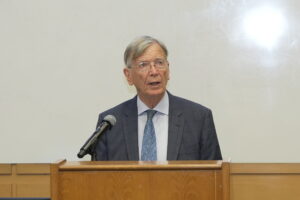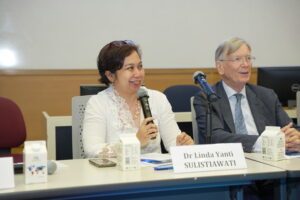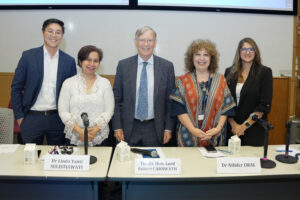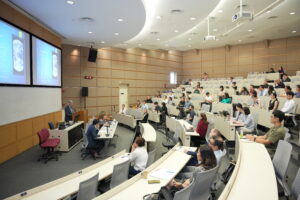Media - News
- Media
- Climate Change and the Courts
Climate Change and the Courts
APCEL and the Centre for International Law (CIL) jointly welcomed the Rt. Hon. Lord Robert Carnwath of Notting Hill (CVO) on 11 April 2024 to speak about climate change litigation. The event was moderated by Dr Tara Davenport, Deputy Director of APCEL and Assistant Professor, NUS Law.

The Rt. Hon. Lord Robert Carnwath of Notting Hill (CVO) giving a presentation
Having been a practicing lawyer for 50 years and a Judge of the UK Supreme Court from 2012 to 2020, Lord Carnwarth shared that he has witnessed how environmental law has emerged as an area of law. In the past, environmental law was not discussed as an area of law and instead, planning law was more prominent. Following the international development of environment-related principles such as sustainable development and the principle of cooperation in environmental issues from the 1970s to 1990s, the Pakistani courts led the way in recognising the right to a healthy environment as part of the constitutional right to life.
Since then, we have seen many environmental and climate change cases. Notably, prior to the Paris Agreement, the US Supreme Court recognised that the Environmental Protection Agency’s duties under the Clean Air Act to regulate air pollution included reducing greenhouse gas emissions, such as from motor vehicles. This paved the way for an ambitious climate change mitigation programme under the Obama administration.
The Urgenda case in the Netherlands saw the Supreme Court uphold the District Court’s decision to impose duties on the government to meet a minimum emissions reduction goal, on the basis that this was necessary to protect Dutch citizens’ rights under the European Convention on Human Rights (ECHR). The Dutch Supreme Court’s decision in Urgenda was prescient considering the recent European Court of Human Rights case involving Switzerland, where the court held that member states have a responsibility under the ECHR to control the effects of climate change to protect their citizens from the serious adverse effects of climate change.
After the Paris Agreement came into effect, there has been a growth of climate change litigation around the world, covering four broad categories: (1) seeking orders against states; (2) challenging planning decisions; (3) seeking orders against fossil fuel companies; and (4) seeking compensation for past damage. Lord Carnwath pointed out that seeking compensation for past damage may not be the way forward, as establishing historical causation is very difficult. Nevertheless, the climate litigation space is growing and a space to watch.
Dr Linda Sulistiawati Yanti, Senior Research Fellow at APCEL, presented her research findings on climate change related litigation in Indonesia. She shared that between 2010 and 2020, 112 climate change related litigation cases have been brought to court in Indonesia. Among these, there are 80 criminal, 15 civil, 12 administrative and 5 judicial review cases.
Dr Linda shared that climate change arguments were more meaningful in civil cases than in criminal cases, in that environmental protection arguments were meticulously used in civil cases while criminal cases only covered climate change arguments superficially. The human rights issues apparent in criminal cases were also not linked to climate change.
She explained that there are a number of driving factors for the inclusion of climate change arguments in criminal and civil cases, including the development of scientific data on climate change, increasing public pressures and the government’s political will to resolve climate change issues. Climate change litigation as seen in Indonesia has the potential to open discussion on climate change, increase accountability in the justice system and drive socio-political changes.

Dr Linda answering questions from the audience
Mr Sean Tseng, Adjunct Senior Research Fellow at APCEL, posed questions to Lord Carnwath about ClientEarth’s attempt to purchase minority shares and commence a shareholders’ derivative action against Shell’s board of directors to manage climate risk. Lord Carnwath expressed his disappointment with the court’s decision not to allow the action, given that the directors themselves had adopted a net zero policy for 2050. Mr Tseng also asked Dr Linda about corporate cases driven by climate change in Indonesia. The response was that the conception of fiduciary duties in Indonesia may be different; for example, the utilities and oil and gas companies have duties to ensure all Indonesians have access to electricity.
Dr Nilüfer Oral, Director of CIL, commented on the increasing importance and expansion of climate change litigation, and posed questions about the impacts of the expected advisory opinions from the International Tribunal of the Law of the Sea (ITLOS) and the International Court of Justice (ICJ). Lord Carnwath responded that it is difficult to tell as the impacts will only be known in the years to come. Dr Linda was of the view that if Indonesian judges are trained in environmental law, these advisory opinions could be impactful in Indonesia because Indonesian judges have the discretion to cite international law in their judgments.
The audience also posed many interesting questions, including about the rise of anti-ESG litigation in the US, and the effects of climate change litigation on environmental policy.
APCEL is delighted to have hosted Lord Carnwath and generated insightful discussions alongside our research staff and CIL.

From left to right: Mr Sean Tseng; Dr Linda Sulistiawati Yanti; the Rt. Hon. Lord Robert Carnwath of Notting Hill (CVO); Dr Nilüfer Oral; Dr Tara Davenport

Audience members watching the presentations

